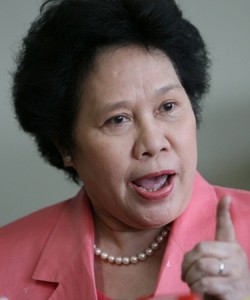MANILA, Philippines — China is “literally testing the waters” to see how far it can go in provoking America’s tolerance with the plan to board foreign ships as an act of asserting its claim over virtually the entire South China Sea.
Senator Miriam Defensor-Santiago said China has been appearing displeased by US military’s plan to “pivot” its presence to Asia following the planned pull-out of troops from Iran and Afghanistan.
To indicate this sentiment, Santiago said China would make things difficult for the US, its Western allies who have been using the sea as a transit route and members of the Association of Southeast Asian Nations where some members have been engaged in disputes with China over areas in the Spratlys in the past years.
However, Santiago warned that China has been pushing its luck in the attempt to provoke “public attention” through antics such as including disputed territories in the map of China printed in newly released electronic passports.
“China is provoking public attention but knows very well she cannot get away with it and that America at some point will put its foot down,” the senator said in a radio interview on Sunday.
It is unfortunate that the Philippines and other countries that would be affected by China’s plan to board foreign ships are caught in the power play it is engaged in with the US, according to Santiago.
“Naggigirian ang dalawang higante (Two giants are in a skirmish). China has become swellheaded because the US has obligations to it that add up to $13 billion,” she explained.
Santiago noted that when the US entered its ongoing financial crisis, its government sold bonds “which is actually an IOU note. Most of these bonds were bought by China.”
The senator said China could be exhibiting a belligerent attitude as a nose-thumbing gesture toward the superpower lender.
By Santiago’s interpretation, China means: “’Akala mo sino ka, nangungutang ka lang sa akin, kaya gagawin ko ang gusto ko (‘You think you’re that special but you’re just borrowing money from me, so I’ll do what I want to do’).”
On the other hand, the senator said China probably felt it was being fenced in by the US’ plan to shift attention to Asia.
“After the announcement to pivot toward Asia, China feels like it is being cornered and could be interpreting this announcement as a challenge (“parang naghahamon”). So literally, China is testing the waters,” she explained.
Santiago added that China’s other tactic would be to stir things up in Association of Southeast Asian Nations, dividing the group between its allies and parties it has been engaged in territorial disputes with.
In July, Cambodia frustrated Philippine officials’ attempts to call attention to China’s intrusion in Scarborough Shoal (Panatag Shoal) during an Asean meeting expected to come up with a joint statement on the matter.
“China wants to hold Asean by the neck because it has allies in the group. Meanwhile, it also has the Philippines and other members affected by the dispute over the West Philippine Sea,” Santiago noted.
“China does not favor a unified Asean, it would rather that the group become fragmented. That’s why it also insists on talking to other claimants to territories in the area separately. United we stand, divided we fall,” she added.
Chinese state media announced that police in Hainan province would be given authority beginning January 1 to search vessels that pass through the South China Sea.
The announcement came at the heels of protests aired by the Philippines, Vietnam, Taiwan and India over the map on the new Chinese electronic passport that depicts disputed areas as belonging to China.
Manila specifically objected to the inclusion of China’s so-called nine –dash-line claim to virtually all territories in the South China Sea that includes Scarborough Shoal and the Spratly island chain that the Philippines partially claims.
The Philippines and Vietnam have refused to stamp visas on the Chinese e-passports.
Senate foreign relations chair Loren Legarda believes Malacañang’s appointment of a new ambassador to Beijing would help ease tensions between China and the Philippines.
“Having an ambassador or an official representative to help clear issues would help. Also…we should not tolerate that kind of treatment, having them climb aboard our ships for inspection and sending us out of disputed seas,” she said in another radio interview.


